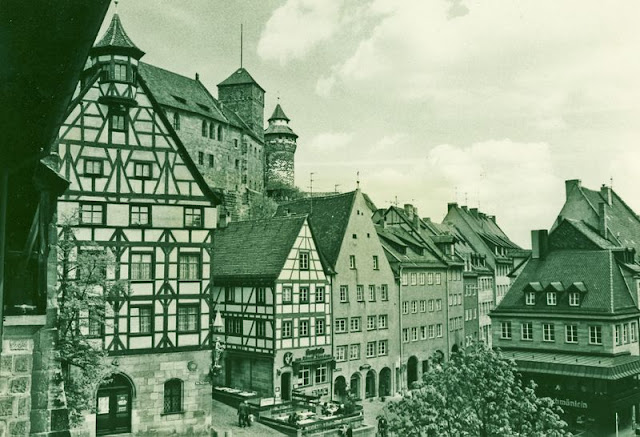Marek Janowski's brisk new Meistersinger.
by Paul J. Pelkonen
This live recording of Die Meistersinger von Nürnberg was made in Berlin at a June 3, 2011 concert performance by the talented, underrated Berlin Radio Symphony Orchestra. Led by veteran Wagnerian Marek Janowski, it is the first of a 10-opera project to preserve new digital version of the composer's mature operas over two years.
As Wagner's lone successful comic opera, Die Meistersinger is always better when heard in a theater. The interplay between characters is often swallowed up in the studio recordings, and live performances are interrupted by the stomping of boots on wooden stages. This recording, made at a concert performance in the friendly, pentagonal confines of the Berlin Philharmonie, is a perfect compromise: the vitality of a live performance minus the stage noises.by Paul J. Pelkonen
 |
| It's a concert recording, so you'll just have to imagine Ye Olde Nuremberg. |
Mr. Janowski's approach to this work is brisk and no-nonsense, with few languors. The Prelude kicks immediately into high gear, with the complex series of fugues and marches taken at speed. He sometimes takes a phrase too fast for the singers' or players' comfort--there are moments where the music seems to "jump" ahead. The trade-off is an energetic performance that bottles the manic wahn that lies at the heart of this very long opera.
The cast is strong. Albert Dohmen, a recent Wotan at Bayreuth is a meditative, serious Sachs who nevertheless has words of wisdom for Walther (Robert Dean Smith) or playfulness with Beckmesser (Dietrich Henschel). The latter is strong too, a flip-side to Sachs without any of the malicious character that often infects performances of this opera.
The tenors fare well here. Robert Dean Smith has a wealth of experience singing Walther von Stolzing, the Franconian knight whose bid to get a date with a burgher's daughter forms the opera's plot. He shows ringing tone and warmth, especially in the Prize Song, but also puts the right notes of metal and rage in his voice in the second act. Peter Sonn makes the "tones list" into a cheerful entertainment, although he swallows the occasional phrase.
Edith Haller has youthful charm but not much else, making a lightweight Eva. However she sings well in the opening phrases of the Quintet and in her verbal duels with Mr. Dohmen's Sachs. Michelle Breedt is better as Magdalene, though she sounds a little old in the role of David's love interest. The best piece of luxury casting is Finnish bass Matti Salminen, who makes an unforgettable cameo (two lines!) as the Nightwatchman.
The mix and balance is bright and forward, with charming little orchestral details coming to the fore. The winds and brass are especially fine, with soft growls in the bassoons for Beckmesser perfectly captured. There is a particular joy in this performance, as the musicians surmount each challenge in Wagner's score. (Even Beckmesser's chalk-scratches sound good.) The set comes in a handsome hardbacked digibook, on four Super Audio CDs. The acts are split evenly, with all of Act I (clocking in at a lean 79:54) fitting on the first disc, all of Act II on the second, and Act III evenly divided. At 4 hours and 15 minutes, this is a quick Meistersinger.
Right at the end of the Prelude, the excellent tonmeister Job Maarse pulls a neat trick. When the organ starts Act I and the excellent Radio Chorus come in on cue, the dynamic range somehow expands. You're thrust into the middle of a bustling medieval city: exactly as Wagner intended. That this recording exists at all is testament to the power of the arts in Europe, and to Germany's deep passion for the ten mature operas of Richard Wagner. It is not the best Meistersinger in the catalogue, but it is an engaging reading and a strong start to this series.
Become a Patron!
Superconductor is free for everyone to read but it does cost money to produce. If you enjoyed this article, it's time to click over to Superconductor's Patreon page, and help support the cost of independent music journalism in New York City. Our Patreon program starts at the low cost of just $5 per month, less than a fancy cup of coffee in this town.




